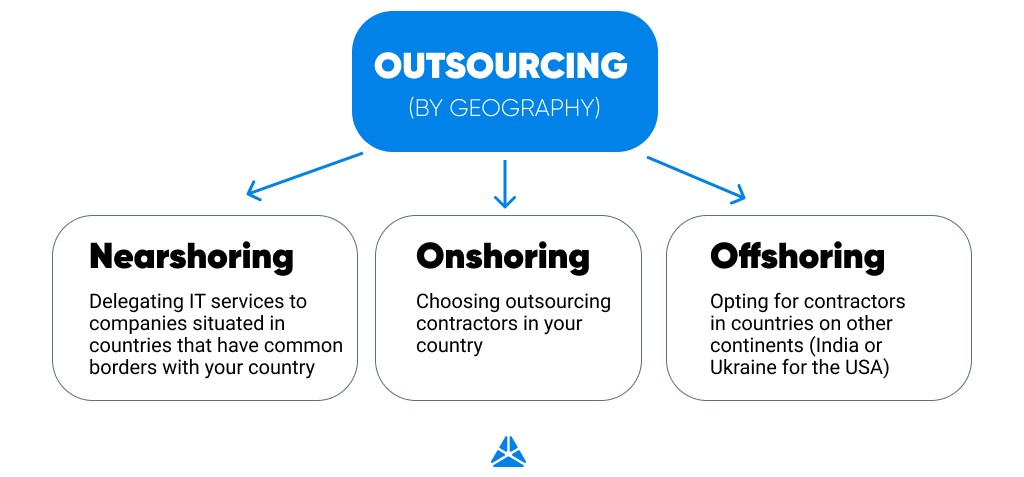Today, we witness the burst of white-collar outsourcing. Among the most common business processes delegated to third parties are billing, medical care reports, R&D, software development, and outsourced IT support services.
To find out more about the pros and cons of delegating IT services, see the answers to the most frequent questions on outsourcing, gathered by MWDN experts.
Contents:
- What is outsourcing? Describe its benefits.
- 15 benefits of outsourcing IT services
- What type of IT can be outsourced?
- What are the risks of outsourcing?
- What are the advantages and disadvantages of outsourcing?
- What are some of the pros and cons of outsourcing a company’s service desk function?
- What challenges and problems do companies face in outsourcing?
- Summing up
WHAT IS OUTSOURCING? DESCRIBE ITS BENEFITS.
The term outsourcing is formed by merging two words – “outside” and “resourcing.” It became widely used in the 1980s and primarily referred to delegating services that demanded low qualifications of workers.
Outsourcing means delegating some business processes to third parties which can be situated in the same country, have common boundaries (nearshore), or be on the other side of the world (offshore).

Today, along with software development, IT companies often outsource customer support services. Ten years ago, the most popular country for support outsourcing was India, but today the geography of this type of outsourcing is much wider. For example, many companies are now considering Ukraine as the place to outsource customer support. This is the way to support the economy of the country at war and to decrease expenses for the labor force, as the salaries in Ukraine are not as high as in the USA or UK.
15 benefits of outsourcing IT services
Delegating software development and help desk functions is so widely spread because it has multiple benefits. Here are the main reasons why companies choose outsourcing IT services:

- Cost reduction. The salary of a software developer in India, the Philippines, or Ukraine can be several times lower than the salary of a US-based specialist with the same set of skills. Because of these geographical differences in remuneration, companies choose to hire affordable specialists abroad.
- Agility. Agility stands for the better speed of innovation enablement and decision-making. With outsourcing, a company can use the maximum of its remote resources to meet the demands of clients during peak seasons and decrease the involvement of third parties when the business doesn’t need them.
- Business scalability. Thanks to agility the business becomes easily scalable and can quickly grow.
- Fast hiring. You don’t need to spend weeks or even months for searching a perfect candidate, your contractor will do it for you.
- Time to market. With outsourcing, you can get your product faster to the market as you can hire as many developers as you need to work simultaneously on your project and thus, increase the speed of deployment.
- Access to a wider pool of unique experts. Due to the shortage of technical talents in their native countries, many companies are forced to start looking for specialists in other states.
- Technology enablement and innovation. By accessing the global labor market, you get the possibility to pick the most unique and highly qualified experts who can bring a competitive advantage to your business via technologies and innovations.
- Flexibility and control. With outsourcing, you can better plan your budget and have more control – you can put your project on pause if needed or accelerate the speed of development.
- Time zone advantage. You can pick several teams in different time zones so that the work on your project never stops and continues 24/7.
- Increased efficiency. When you follow the main rule of outsourcing – “Do what you can do the best and outsource the rest,” you inevitably come to better efficiency of all your working processes.
- Focus on core businesses. By delegating side projects to outsource companies, you can maintain the focus of your in-house team on your core projects.
- Compliance. All laws will be followed, all certificates will be obtained, and all the software you’re using will be updated on time to guarantee the security of your project.
- Access to unique resources. By seeking assistance in the global market of software development, you get access to the most innovative technologies.
- No need for management and control. If you have a clear vision of the final result you want to obtain, you don’t have to control your remote dedicated team through the whole process of development. Unless you want to.
- Planning ahead. When you sign a contract with the outsourcing contractor, you make a road map that in due time will bring you to your strategic goals.
WHAT TYPE OF IT CAN BE OUTSOURCED?
Some businessmen believe that you should keep your core business, strategic planning, and human resource departments in-house, however, this is just their assumption and not the law. Others believe that you should “do what you do best and outsource the rest.” Overall, you can delegate to third parties any type of IT services:
- Helpdesk
- Customer support
- Contact center
- Cloud IT support
- Technical recruiting
- Mobile and web development
- Front-end and back-end development
- UI and UX design
- Quality assurance
- Content management
- Code maintenance
- Research and development
- Cybersecurity
- DevOps
- Product management, etc.
WHAT ARE THE RISKS OF OUTSOURCING?
Sometimes outsourcing might fail. In most cases, this is a result of cooperation with an unreliable contractor. Be sure to double-check the company’s reputation and portfolio before you sign an outsourcing contract. In general, these are the most common risks of outsourcing:
- Lack of delivery. Your contractor might break your deadlines or deliver a code of poor quality. The only way to prevent this from happening is to thoroughly choose your contractors and to sign contracts with clear conditions of code acceptance.
- Lack of control. Communicate with your contractor beforehand about what level of control over the project you want to maintain. Set up regular meetings with the technical team and management to keep track of product development.
- Legal issues. To keep your intellectual rights intact, along with the general contract sign the confidentiality agreement and the protection of intellectual rights agreement.
- Cultural differences. They might become an obstacle when it comes to UX design and development. The practices of interface perception might differ depending on the language people talk and their overall cultural background.
- Language barrier. When you choose offshore outsourcing, ensure that at least a project manager of your remote team speaks your language well. This will help you avoid miscommunications in the future.
- Data protection and customer rights. Make sure that your contractor applies the best market practices for privacy compliance.
WHAT ARE THE ADVANTAGES AND DISADVANTAGES OF OUTSOURCING?
Covering up everything that was said earlier, here are the main advantages and disadvantages of outsourcing:
| Advantages of IT outsourcing | Disadvantages of IT outsourcing |
|---|---|
| 1. Cost efficiency. 2. Access to a larger pool of technical specialists. 3. Ability to hire the most unique and skilled experts. 4. Faster time to the market. 5. Higher business scalability. 6. More flexibility. 7. Better control over deadlines and budgets for the project. | 1. Less control over the processes. 2. Possible lack of delivery and postponed deadlines if you chose a second-rate outsourcing company. 3. Data protection and intellectual rights protection issues. 4. Possible miscommunications in case of language or cultural barriers. |
WHAT ARE SOME OF THE PROS AND CONS OF OUTSOURCING A COMPANY’S SERVICE DESK FUNCTION?
Pros of outsourced Help Desk: Three reasons to outsource service desk/customer support
- It’s cheaper. Because of the geographical discrepancies in salaries, hiring a team of support specialists offshore might be up to ten times cheaper than keeping an in-house support department.
- Scalable support team. Get more support members when you need them and downscale the team when the high season is over.
- You can enjoy the best support practices without paying for their development. The best market players always have something extra to offer. For example, your innovative contractor might offer you an ML-based chatbot to make initial communication with your clients.
Cons of outsourced service desk
There might be a language barrier. You will have to keep the hiring process under control to make sure that your high expectations towards your support are met. Otherwise, your clients might start complaining about the accent of your support team members and constant miscommunications.
Utmost attention should be paid to the staff training. If you want your offshore support specialists to comply with your company’s culture and code of conduct, you will have to provide them with constant training.
WHAT CHALLENGES AND PROBLEMS DO COMPANIES FACE IN OUTSOURCING?
The biggest challenge of IT support outsourcing is to find a reliable company to whom you can delegate this part of your business. To stay on the safe side, double-check the reputation of your contractor and make sure it has hands-on experience in your field.
Another problem that makes many companies refrain from outsourcing is the possibility of poor delivery and low quality of services. You can tackle this problem by choosing a trustworthy contractor in the first place, and by setting up clear KPIs and expectations for your new remote team.
The possibility of miscommunications is the third largest obstacle that some companies face when outsourcing their IT services. Miscommunications can happen because the head office and the remote team speak different languages and because they’re situated in different time zones. The only way to prevent them from happening is to discuss these issues before you sign a contract.
Summing up
Outsourcing is a cost-efficient, productive, and trustworthy business model. Today it is highly popular among all kinds of businesses, including software development and help desk functions. It is widely used both by small start-ups and IT giants. For example, Google outsources support team functions of AdWords to multiple teams in more than 60 countries. Other technology companies like Slack, Alibaba, Apple, GitHub, and Microsoft also benefit from outsourcing part of their software development, R&D, or help desk functions.
Outsourcing or one of its variations, staff augmentation, is a simple way to cut costs, increase your project’s competitiveness, and enjoy the latest innovations in the global tech market. Be sure to contact us if you still have doubts about whether outsourcing is exactly what your business needs.
Content
- 1 WHAT IS OUTSOURCING? DESCRIBE ITS BENEFITS.
- 2 15 benefits of outsourcing IT services
- 3 WHAT TYPE OF IT CAN BE OUTSOURCED?
- 4 WHAT ARE THE RISKS OF OUTSOURCING?
- 5 WHAT ARE THE ADVANTAGES AND DISADVANTAGES OF OUTSOURCING?
- 6 WHAT ARE SOME OF THE PROS AND CONS OF OUTSOURCING A COMPANY’S SERVICE DESK FUNCTION?
- 7 WHAT CHALLENGES AND PROBLEMS DO COMPANIES FACE IN OUTSOURCING?
- 8 Summing up